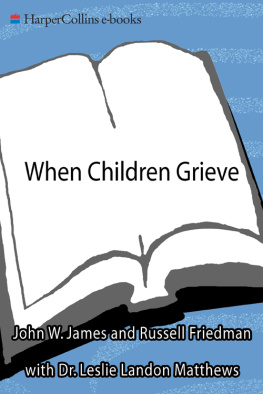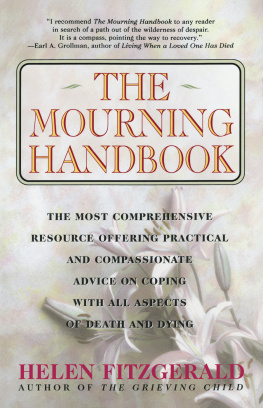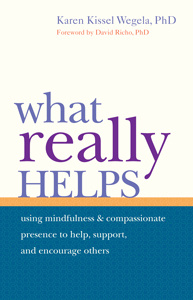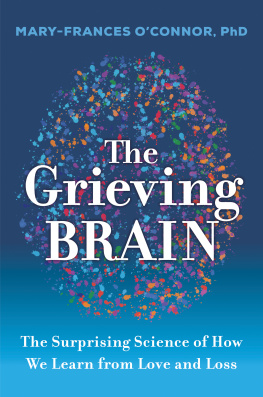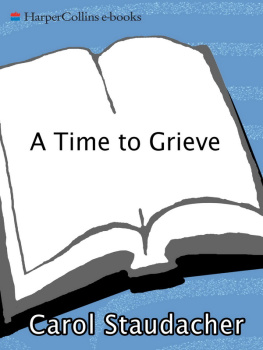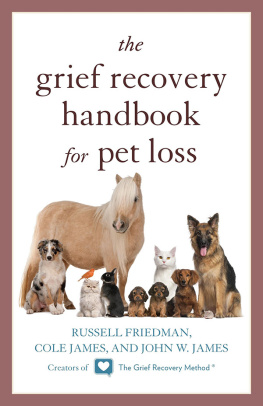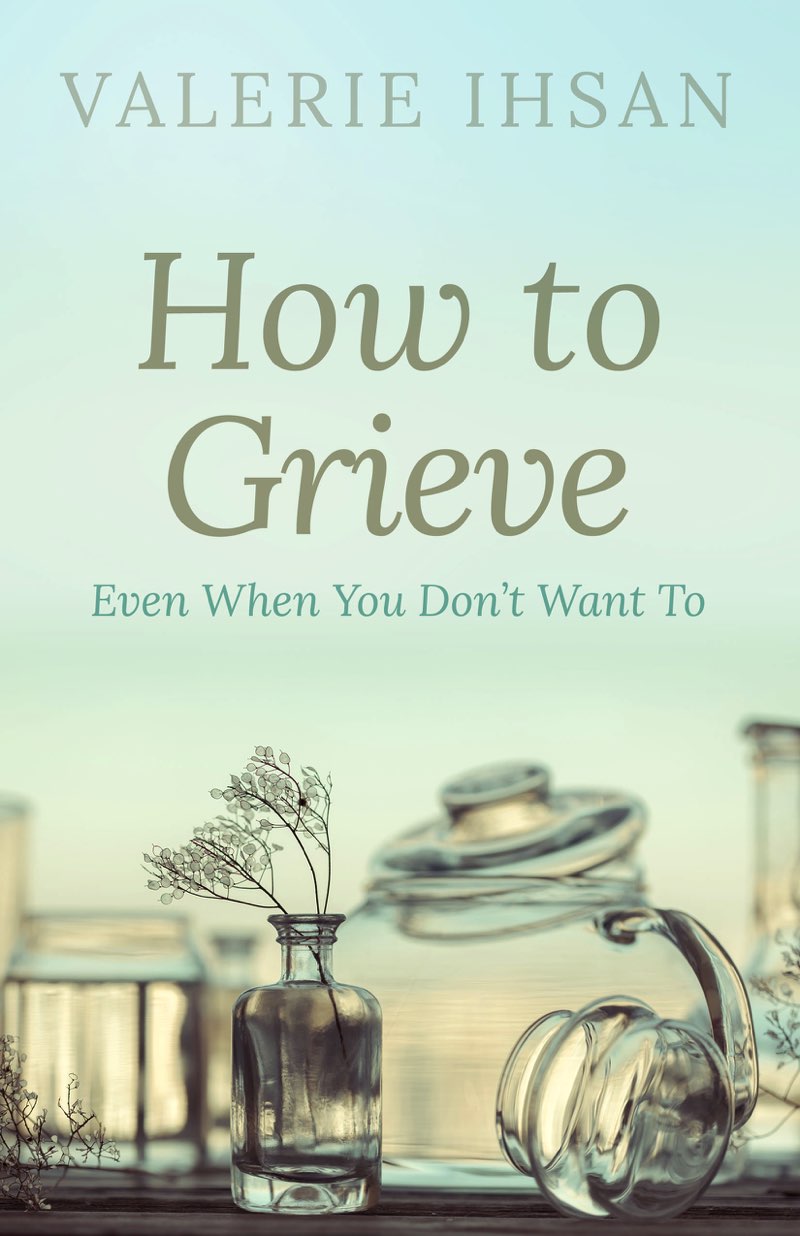How to Grieve
Even when you dont want to
Valerie Ihsan
Contents
Foreword
W hen I was 26 , I told my husband, Rob, we were finally pregnant with our second child. We'd been trying for eight months. Later that same day, Rob died. He fell asleep driving and hit a highway signpost.
I was pregnant and was now a widow. I had a 22-month-old child.
I didn't know how to be a widow. I didn't know any widows. I had no road map, no blueprints. There was no how-to guide, and prior to 9/11 there weren't many books on grieving a spouse at such a young age.
Let this booklet be that guide for you.
Certified Bereavement Facilitator since 2004; Widow since 2000.
A fter you've heard the news, everything is a normal reaction. You could cry, scream, stare at the wall, rock yourself, eat, or throw up. It's all normal. There's no one right way to grieve.
L ET SOMEONE KNOW . Let your family/friends/neighbors help you. You can't do this alone. Most likely someone else will pick up the reins at this point and finish notifying whoever needs knowing. Food will materialize. Your house chores will start being done by others, and you can continue to stare at the wall. That's what I did. I cried, too, but mostly I just sat. And waited. For whatever was going to happen next.
M AKE ONLY IMMEDIATE DECISIONS . There'll be plenty of other little things you'll be called upon to deal with. Don't worry about the long-term stuff right now. The mainstream advice is not to make any major decisions right after a tragedy. Sometimes it can't be helpedlike approving an organ transplant, or needing to move out of the rental house that you can no longer afford on one salarybut put off whatever you can. I was fortunate enough to not have to decide anything at first, except choosing his casket and answering funeral/wake related questions.
Your head and heart are so full of other things, you aren't in your right mind. How can you make a major life decision at this time? I did move after my husband died, but I waited six months before deciding and then made it happen in the following two. Part of my hurry was my pregnancy. I wanted to be settled before I gave birth. But I still staged it so that there were built-in chunks of time where I could stop and re-assess. And I had family helping me through the process.
For instance, when I moved to Oregon, I moved into an apartmentthat my mother secured for meknowing I wanted to purchase a house. I didn't want to hurry through the process of figuring out what would work best for my family's needs. Staying in the apartment for five months allowed me to settle in and breathe, give birth to my son, get used to living by myself (with children), and slowly look at houses.
Those other little things that pop up will seem so insignificant that you'll be pissed you're being asked to deal with them. How dare I have a college final a week after my husband dies? How dare I have a dental appointment right now? How dare I have a pre-cancerous mole I need to have removed twelve days after I've buried my best friend?
All three of those examples were ones I dealt with within three weeks of my husband's death. Yours will be different. Perhaps you'll have to give a presentation at work, or fire a care-giver. Sometimes it just can't be postponed and you muddle through it as best as you can.
G IFTING . You'll be approached by family and friends asking for something to help them remember your loved one. A shirt. A picture. A lunch box. Whatever. Others are grieving, too. And sometimes the request won't come out so well. It might feel greedy to you, or insincere. Or maybe you'll just panic at the thought of giving something away that was your beloved's. Most likely you'll have a heart-felt request for some small token, and they'll make it clear that you needn't bother with it until you are ready.
I, personally, gifted out Army pins, clothes, cuts of cloth (when more than one person wanted the same favorite flannel shirt), a Boston Bruins coat, and the head of a hockey stick.
Y OU'LL HAVE VISITORS . But don't feel you have to entertain. Let them do for you. Ask for help, if you can. Otherwise, just let them be in the same room with you. They want to be helpful and they might not know how, so let them sit with you and not talk, or let them cry with you. Both can be cathartic.
Chapter 2
At Home and Work
E MPLOYMENT /PAPERWORK. When I decided to quit my job after Rob died, my boss was genuinely confused. She thought it was best to keep busy when grieving. And so it is, for some. But truth be told, I was busy. So busy. At home I had a toddler, a pregnancy, doctor's appointments, calling creditors to cancel credit cards, and applying for death benefits from the Social Security office, the V.A., and my husband's place of business. I needed to get his things from work, I needed to invest the life insurance money I fortunately received, and I needed to sleep and grieve. It was all exhausting. I didn't have the time or energy for a job.
Unfortunately, some grieving spouses don't have this luxury, and some, I'm sorry to say, need to now get two jobs to fill the gap. If this is the case for you, please, seek as much assistance as possible from government programs, family, and friends. Again, you don't have to do this alone. It's best for all if you don't.
R ELIGION /SPIRITUALITY. There is a great deal of variety here, and so much room for exploration. Some find refuge and comfort in their church or religion; some lose their faith and leave it. As time passes, you might find yourself wanting to explore or practice a different religion or spiritual way of life. If you do, this is normal, too. After all, we are not the same as we were before our tragedy. The religion of my childhood couldn't serve me after my husband's death, so I explored other beliefs and found the right avenue for myself.
Some might feel threatened by your exploration, but this is your grief journeya personal and private matter for you. Don't let others bully you in, or out, of what you feel is right for you at this horrible time in your life. You are in charge. Even if it doesn't feel like it.
T ELLING THE CHILDREN . This was terrifying for me. And it's tricky. It depends greatly on the age of the child. Different age groups have different cognitive abilities and needs, and require different communication from us. You must be careful what you say. Children are very literal-minded.
You don't want to say that the deceased love one is sleeping, because the child will continue to wait for them to wake up, or worse, not want to go to sleep themselves for fear of never waking up again.
And what if you say they've gone to heaven, and then they want to die so they can go to heaven, too? I was so worried about saying the wrong thing to my two-year-old daughter and scarring her for life. How do you tell your toddler that her daddy is dead?
Ultimately, I think you have to listen to your gut and then run it by someone else first. Talk to people who are familiar with this. Consult a counselor, a grieving expert, or other parents that are widows, or widowers.


